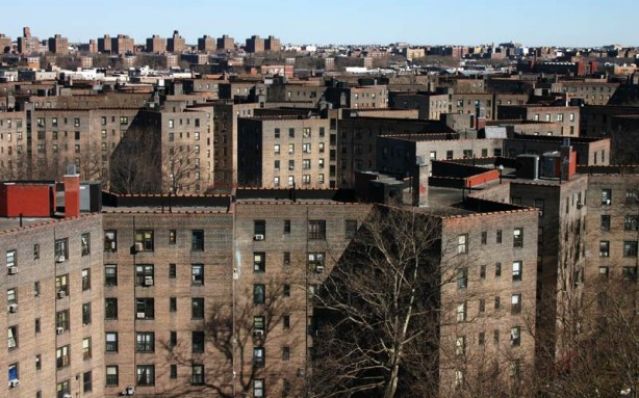The New York Housing Authority (NYCHA) is in crisis, as is evident by a repair bill topping $31.8 billion in capital need and hundreds of horror stories of lead paint, heat outages, mold and more. But it’s not only the public housing residents themselves at risk if NYCHA doesn’t get its act together, according to a new report out Tuesday from Regional Plan Association.
The success of NYCHA is tied to the entire economy for New York City and officials would actually have to foot a higher bill, experts say, if some public housing closed and forced hundreds of thousands of people into shelters or out of the city.
Regional Plan Association (RPA) is a nonprofit that pushes for changes in the area’s infrastructure planning and repair. Just like transportation or the water delivery system, NYCHA is part of New York City infrastructure, explained Moses Gates vice president for Housing and Neighborhood Planning at RPA.
While NYCHA may be on par with the New York City subway in terms of infrastructure importance, it’s actually worse off. Yes, worse off than the subway, according to the report: NYCHA’s capital need is expected to grow to $45.2 billion in the next 20 years, exceeding the projected costs to fix the subway.
But unlike the subway, not all New Yorkers interact with the deteriorating public housing. Beyond the fact that everyone deserves a “safe and habitable” place to live, Gates said, the state of NYCHA affects everyone.
“I haven’t met one New Yorker from any borough or any stage of life or any particular means who doesn’t complain about their housing situation,” he said. “When you let the most affordable housing deteriorate and potentially disappear in a city with a housing crisis, that is the best way to exacerbate a housing crisis.”
Public housing is the most efficient way for a city to house low-income residents, Gates added. NYCHA developments have little overhead, he said, because the buildings are already built and the federal government funds some operating costs.
But if New York City had to house or aid these public housing tenants in other ways like through a voucher system or emergency shelters, it would be an “exponentially larger” cost.
If just 10 percent of NYCHA developments were lost, per the report, 40,000 New Yorkers would have to compete in the private housing market or be pushed into homelessness.
“If something falls apart, you repair it and then it’s good for a little bit,” Gates said. “If you let something fall apart and then you have to deal with the results, the humanitarian and fiscal cost is ongoing and permanent.”
The 400,000 NYCHA residents also play an important role in New York City’s workforce and economy. These residents work at about the same rate as the entire population, but are disproportionately represented in jobs within education, healthcare, transportation and manufacturing.
“We have a significant elderly population that relies on home health care services, a significant young population that relies on education,” said Gates. “Losing teachers and aides and nurses [is] I don’t think something anybody thinks is a good idea.”
Read the full RPA report here.
NYCHA and HUD: Future of NYC public housing
Mayor Bill de Blasio on Tuesday met with U.S. Department of Housing and Urban Development Secretary Ben Carson over the future of NYCHA.

HUD Secretary Ben Carson. Photo: Reuters
Carson threatened a federal takeover of NYCHA if New York City doesn’t have a plan to fix the beleaguered public housing authority by Jan. 31. While de Blasio did recently announced NYCHA 2.0 and a new labor plan to speed up repairs, federal control is still an option after a judge shot down an agreement between the city, NYCHA and HUD last month.
But a federal takeover of NYCHA, the largest public housing authority in North America, would be “disastrous,” said Victor Bach, a senior housing policy analyst at the anti-poverty nonprofit Community Service Society.
“[HUD] doesn’t have the capacity to administer receivership, particularly one as large as NYCHA, 176,000 units. It’s never done that before, and the record on HUD-administered receiverships is not that good” he said. “HUD is in worse shape than ever to undertake receivership given its loss of experienced personnel in recent years and the administrations hostility to public housing.”
The mayor and Carson seem to agree and both hope to avoid HUD receivership of NYCHA.
“I think there was a broad agreement that we’re going to do all together to avert it,” de Blasio said at a press conference after his meeting with Carson. “That both HUD and the city of New York believe there’s a better way and that better way is to come to a settlement.”

























